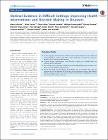| dc.contributor.author | CLARKE, MICHAEL | en |
| dc.date.accessioned | 2014-07-22T14:59:03Z | |
| dc.date.available | 2014-07-22T14:59:03Z | |
| dc.date.issued | 2014 | en |
| dc.date.submitted | 2014 | en |
| dc.identifier.citation | Gerdin M, Clarke M, Allen C, Kayabu B, Summerskill W, Devane D, MacLachlan M, Spiegel P, Ghosh A, Zachariah R, Gupta S, Barbour V, Murray V, von Schreeb J., Optimal evidence in difficult settings: improving health interventions and decision making in disasters., PLoS Med., 11, 4, 2014, e1001632- | en |
| dc.identifier.other | Y | en |
| dc.identifier.uri | http://hdl.handle.net/2262/70465 | |
| dc.description | PUBLISHED | en |
| dc.description.abstract | As for any type of health care, decisions about interventions in the context of natural disasters, conflict, and other major healthcare emergencies must be guided by the best possible evidence.
Disaster health interventions and decision making can benefit from an evidence-based approach.
We outline how systematic reviews and methodologically sound research can build a much-needed evidence base.
We do this from the standpoint of Evidence Aid, an initiative that aims to improve access to evidence on the effects of interventions, actions, and policies before, during, and after disasters and other humanitarian emergencies, so as to improve health-related outcomes. | en |
| dc.format.extent | e1001632 | en |
| dc.language.iso | en | en |
| dc.relation.ispartofseries | PLoS Med. | en |
| dc.relation.ispartofseries | 11 | en |
| dc.relation.ispartofseries | 4 | en |
| dc.rights | Y | en |
| dc.subject | systematic review | en |
| dc.title | Optimal evidence in difficult settings: improving health interventions and decision making in disasters. | en |
| dc.type | Journal Article | en |
| dc.type.supercollection | scholarly_publications | en |
| dc.type.supercollection | refereed_publications | en |
| dc.identifier.peoplefinderurl | http://people.tcd.ie/clarkem2 | en |
| dc.identifier.rssinternalid | 95388 | en |
| dc.identifier.doi | http://dx.doi.org/10.1371/journal.pmed.1001632. | en |
| dc.rights.ecaccessrights | openAccess | |




